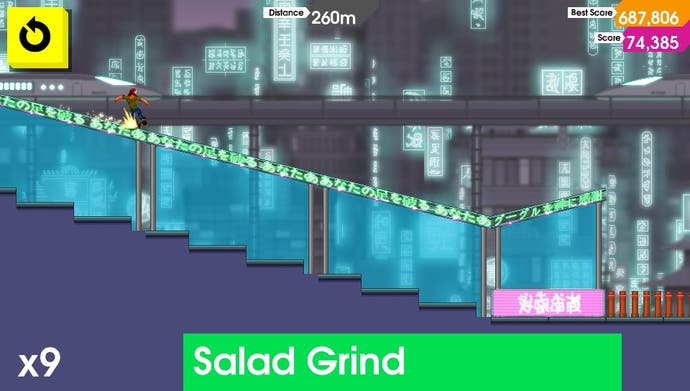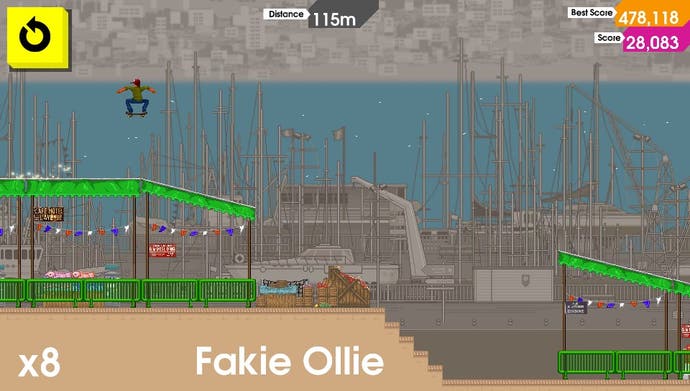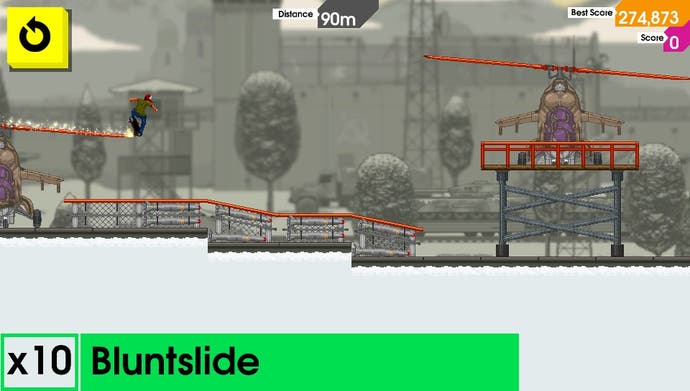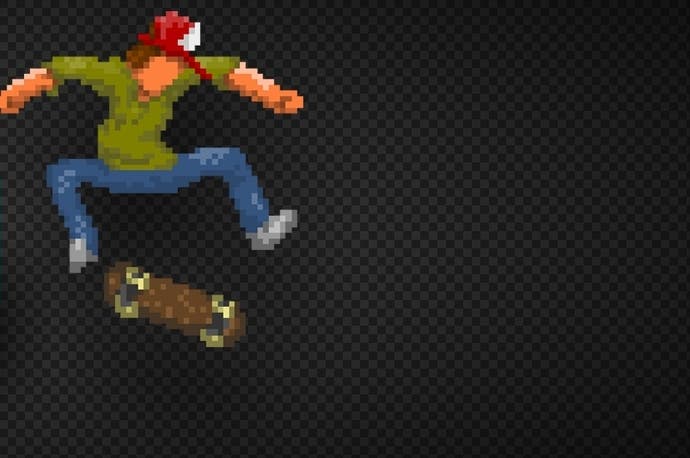OlliOlli review
Fingerboard.
Mastery of the skateboard and mastery of the twitch arcade game share a fundamental similarity: in each case the goal is to achieve flow, a removal of the friction that exists between the human mind and body. In video games, that means entering a state where you are able to weave unerringly between obstacles or threats without deliberate thought. Your will and your on-screen avatar act as one. In skateboarding, flow is where you physically move through your environment without interruption, grinding along rails, jumping over obstacles and linking tricks together, thereby transforming the contours of a park or city into a single, unbroken track along which you travel.
At times, video games and skateboarding have converged, the sense of flow in the latter replicated in the former. But perhaps never more so than in OlliOlli, a PlayStation Vita game from first-time console game developer Roll7 that's crafted with a keen understanding of the parallels between flow in the physical world and in the virtual. No video game has better demonstrated the skateboarder's talent for viewing an environment's lines and shapes as a canvas for spectacular travel, and few video games have encouraged flow in their player with such breezy ease.
Viewed from a side-on perspective, each of the game's colourful stages presents a meticulously arranged sequence of obstacles, rails and surfaces, all of which can be linked together into a chain of tricks and grinds. As the combo grows in length and complexity, so the points awarded multiply. So too, however, do the stakes. High scores are won by chaining tricks and grinds together, ideally moving though a level in an unbroken sequence before the final landing. But your score won't be 'banked' until you successfully land. Each trick must be punctuated with a safe return to terra firma, else all the preceding showboating will be, quite literally, pointless.

OlliOlli's unique control scheme requires a tap of the X button before you land your deck. The later you tap the button, the higher the multiplier that's added to your score. Leave it too late and your skater will tumble to a wounded end. Sloppy landings don't only slash your score; once you fall, there is no getting up. The stage must be restarted.
It's possible to grind most ledges, benches and other flat or angled surfaces in the game. Similarly to landings, holding down the left stick moments before you hit the ledge triggers a grind, and the later you hold down the stick, the greater the score you net. Every interaction in the game has its own risk/reward dynamic: you're constantly being dared to leave your button presses later, in order to increase your score, but doing so escalates the risk that you'll fall to the ground with nothing to show for your effort.
The usual repertoire of professional skater tricks can be executed while transferring from objects in a stage and, as you might expect, the higher value moves demand more complicated button inputs. Rotating the left stick before an ollie will launch an advanced trick, with quarter, half or three-quarter circles each triggering different types of moves. You can even add spins to your tricks by using the Vita's bumper buttons to squeeze the highest amount of points from each interaction. There's an initial bump of a learning curve with all of these possibilities, but once assimilated into your muscle memory, OlliOlli's rhythms prove intoxicating - helped no end by the Trials-style quick restarts, which trigger an instant, rolling fresh attempt.

The presentation is clean, stylish and minimalist. The greatest indulgence the team allows itself is the occasional particle effect, a green sparkling mist that trails the skater as he rasps along a rail at high speed. In all other ways, OlliOlli is restrained and understated, a far cry from the usual punky power-chord bluster of skateboarding games. The game runs deep, too. There are five stages in each of its five worlds (each one straightforwardly themed: Urban, Junkyard, Port and so on). But each stage has a clutch of specific challenges to complete (such as executing a specific trick, or passing a score threshold). Complete all of the challenges and you'll unlock that stage's Pro mode, a vastly more challenging version. Unlock each of the challenges in this mode and you unlock the stage's Rad mode, the most troublesome yet exhilarating iteration.
As well as the career mode, each of the game's stages has a 'Spot', where you compete with other players around the world to net the high score for a specific section of terrain. You are only allowed one combo per run in 'Spots' mode, and these 10-second high score challenges provide a wonderful diversion from the longer runs. Perhaps as a way to lighten the load on Sony's servers, or maybe simply to serve the game's elegant aesthetic, each level only shows your score, that of the highest scoring player in the world, and your current position in relation to everyone else. There's no way to browse the leaderboard, which is no great loss - but the inability to compare scores with people on your friends list is frustrating.
Elegant, understated and yet with the capacity for wild showboating, OlliOlli is a twitch classic, a startling console debut

Alongside the main game, OlliOlli offers up a 'Daily Grind': a one-off level that can, with practice, be strung together into an unbroken sequence of tricks. Practice is all you've got: once you decide to 'play for real' (to use the game's parlance), you have just one attempt to register a score. Make it all the way to the end of the level and fail to land and 'bank' the points, and you'll be sent off to the leaderboard with nothing but miserable small change to show for your effort. Thereafter you're locked out of the level until, after 24 hours have passed, a new challenge is unlocked for players to compete over.
The concept owes a debt to Spleunky's daily challenge, and is arguably even more effective in this context, where no matter how masterly your run has been, everything can be lost at the final second. For a game without an orthodox multiplayer mode, the asynchronous challenge proves a powerful daily draw back into the game, long after the career mode has been exhausted. The feeling when you secure the top spot on any day is nothing short of exquisite.
Elegant, understated and yet with the capacity for wild showboating, OlliOlli is a twitch classic, a startling console debut from a young British indie that manages to bring together the purity and focus of seminal arcade games with the latest asynchronous multiplayer designs. Moreover, it's a game that serves the ambition of its theme - physical flow and the mastery of architecture with a plank of wood and a quartet of rattling wheels. Find flow here and you may find the very essence of the sport that the game so joyfully celebrates.

















